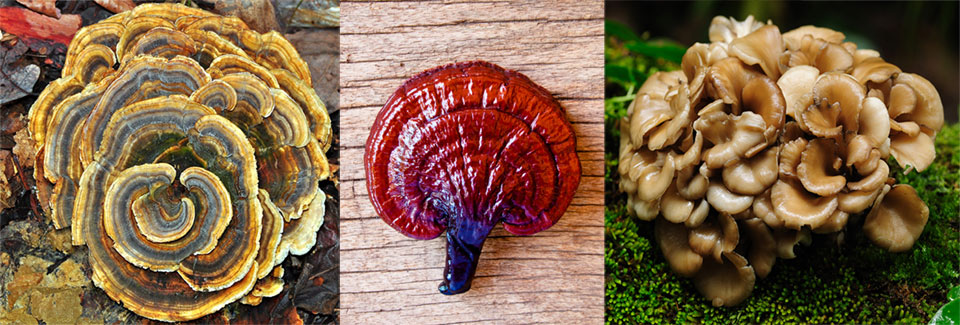There are natural ways to enhance your well-being using the ancient wisdom of medicinal mushrooms. At The Natural Medicine Practice in Brighton & Hove, we utilise the medicinal properties of fungi to offer natural medicine solutions. Our personalised approach harnesses the unique properties of these mushrooms to address your individual health goals.

Contact us today to find out more about the benefits of medicinal mushrooms.
What are the benefits of Medicinal Mushrooms?
Medicinal mushrooms may provide some or all of the following benefits:
- Immune System Support: Many medicinal mushrooms contain polysaccharides, complex sugars that stimulate the immune system to fight off illness
- Reduced Inflammation: Certain mushrooms boast properties that may help decrease inflammation in the body, potentially easing pain and chronic conditions
- Enhanced Energy Levels: Some medicinal mushrooms are adaptogens, meaning they may help the body adapt to stress and improve energy levels
- Cognitive Function Support: Studies suggest that some medicinal mushrooms benefit cognitive function and memory
- Overall Well-being: Many users report medicinal mushrooms improving their general well-being, potentially due to a combination of the benefits listed above.
Medicinal Mushrooms: More Information
Medicinal mushrooms have received much praise relatively recently as a direct result of scientific studies into their efficacy, confirming ancient traditional uses and also highlighting new applications in some instances. Compounds called polysaccharides, large complex branched chain-like molecules built from many smaller units of sugar molecules have been studied in detail since the 1950s – these have shown to possess anti-tumour and immunomodulating properties. Humankind culturally has benefited from mushrooms for perhaps as long as 7,000 years.
We humans have around 30 percent of our DNA in common with mushrooms and another similarity is that both inhale oxygen and exhale carbon dioxide, unlike the plant kingdom. One mycologist has likened the internet to the mycelial network filaments of mushrooms around the planet, so crucial are they to biodiversity and subtle information exchange between species. They sustain and work in symbiosis with all life forms both directly and indirectly on a concurrently living and decaying planet, thus helping in its survival and transformation. Mushrooms were one of the earliest forms of life to begin inhabiting the Earth.
They are adaptogens in that they encourage the body to adapt to many varied environmental and psychological stresses having an all-round supporting effect on all the major human systems, for example, the nervous/immune system, hormonal system and blood sugar system regulation. Their beta-glucan component also helps with immune modulation, medicinal mushrooms can increase macrophage and killer cell activity – this can help protect against colds, flu and infections of all kinds.
As an aside, mushrooms are coming into their own in their ability to clean up toxic earth environments. Humankind has not as yet tapped into the full potential of employing specific mushroom agents in dispersing and cleaning up all manner of natural and man-made disasters. In Japan, much headway has been made in pioneering use of medicinal mushrooms and cancer treatment. There is great potential benefit in their use with individuals suffering from HIV/AIDS, heart disease, compromised immune systems, supporting eyes and digestion and a whole array of skin ailments etc.
Medicinal mushrooms vary in their nutritional profile depending on species and various factors such as maturity during different harvesting stages. They contain a wealth of important nutrients such as protein, carbohydrates, amino acids, vitamins and minerals. Mushrooms are a good source of thiamine, riboflavin, niacin, biotin and vitamin C. Beta carotene can also be found in some species. The mineral content of phosphorus, sodium, and potassium is balanced and satisfactorily high whilst iron and calcium are lower in amounts. An individual’s given level of digestive capacity (effectiveness of digestive enzymes) will influence the body’s ability to uptake essential nutrients present in medicinal mushrooms.
Immunological changes triggered by mushroom polysaccharides:
- Immune cell activation of: macrophages, neutrophils, monocytes, NK cells or Natural Killer Cells and dendritic cells
- Antibody production increases
- Interferon production increases
- Immune system activity increased against a range of cancers
- Tumour metastasis inhibition
- Pro-inflammatory cytokines reduction
- Prostaglandin synthesis inhibition
